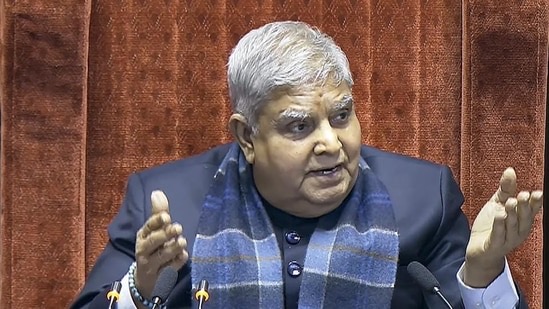Jagdeep Dhankhar and Opposition have had a tumultuous relationship. This is why no-trust vote move against him, though unprecedented, comes as no surprise. From a fiery left-of-centre Janata Dal activist to a centrist dyed-in-the-wool Congressman and finally, a right-wing Hindutva die-hard, Vice-President of India Jagdeep Dhankhar has had a truly chequered career. This week, he became the first person holding one of the top two constitutional posts to face the prospect of impeachment as the Opposition submitted a notice to move a no-confidence motion against him.
A no-confidence motion against the vice-president is not just unprecedented, it is no small matter. If introduced, it would require the support of a majority of all the members of the Rajya Sabha and needs to be ratified by the Lok Sabha, according to Article 67(b) of the Constitution.
While the motion is unlikely to be adopted, as opposition parties lack the numbers, the political messaging is clear – they are not being allowed to speak in the Rajya Sabha by its chairman and presiding officer, Jagdeep Dhankar. The vice-president – and former West Bengal governor – has clashed with the Opposition, no holds barred. Last week, Dhankhar objected to the Opposition’s demand to raise the issue of farmer protest, dubbing them as “crocodile tears”. It prompted a section of opposition leaders to walk out.
At the height of the drama over the disqualification of wrestler Vinesh Phogat from the Paris Olympics 2024, as opposition leaders sought permission to discuss the matter, Dhankar rebuked them, later telling the Rajya Sabha: “They (Opposition) think they are the only ones whose hearts are bleeding. The entire nation is in pain because of the girl. Everyone is sharing the situation but to monetise it, politicise it, is the greatest disrespect to the girl.” Phogat, like Dhankhar, is a Jat.
In August 2023, Dhankhar told the Opposition that he “could not and would not” direct Prime Minister Narendra Modi to be present in the House as it was the PM’s prerogative, like any other MP, to come to Parliament. He made this statement as the Opposition benches continued to demand the PM’s presence in the Rajya Sabha to address them on the issue of Manipur violence.
Relations between the feisty Rajya Sabha chairman and the Opposition hit a new low during the Winter Session in 2023 when 146 MPs were suspended from both Houses of Parliament, mostly over their demand for Union home minister Amit Shah’s statement on a Parliament security breach. It was the highest-ever number of suspensions in a Parliament session.
In June 2024, Dhankhar hit the headlines after Congress chief Malliarjun Kharge entered the Well of House during a protest against paper leaks, with the Rajya Sabha Chairman pronouncing that this was the first time that a Leader of Opposition (LoP) had done such a thing, calling it a “stain” on Parliament. Kharge responded by saying he was trying to grab the attention of the Chairman who was looking towards the Treasury benches.
A month later, Rajya Sabha MP Kapil Sibal questioned the manner in which the Upper House was being run by Dhankhar and claimed that in no country the presiding officer of a House “frequently interrupts” members during their speeches. The same month, Dhankhar – the former Congressman and Janata Dal leader – said the RSS has “unimpeachable credentials” and Constitutional rights to contribute to the nation’s development. “RSS is an organisation which is a global think tank of the highest order…,” he told a disbelieving House.
In September, in an apparent reference to Lok Sabha LoP Rahul Gandhi, Dhankhar, without taking names, said nothing was more condemnable than someone holding a Constitutional post becoming “part of enemies of the nation”. Dhankhar was speaking at Parliament to the third batch of the Rajya Sabha internship programme. He was apparently reacting to Gandhi’s recent visit to the US, where he said that “love, respect, and humility” were missing from Indian politics.
In August 2022, Dhankhar who was elected vice-president and began his term as the Rajya Sabha chairman, showed the first signs of rocking the boat when he called the Supreme Court’s 2015 judgment striking down the National Judicial Appointments Commission (NJAC) Act a “glaring instance” of “severe compromise” of parliamentary sovereignty and disregard of the “mandate of the people”.
Before being elected as vice-president, Dhankhar had a tumultuous term as governor of West Bengal, where he began a virtual baiting of chief minister Mamata Banerjee. From the law-and-order situation in the state and post-poll violence to corruption accusations, alleged lapses in bureaucracy and the appointment of vice-chancellors in state universities, Dhankhar never pulled his punches. The state government in turn accused him of sitting on important Bills. The situation took a grim turn when the state government in 2022 replaced the Governor with the CM as chancellor of state universities.



